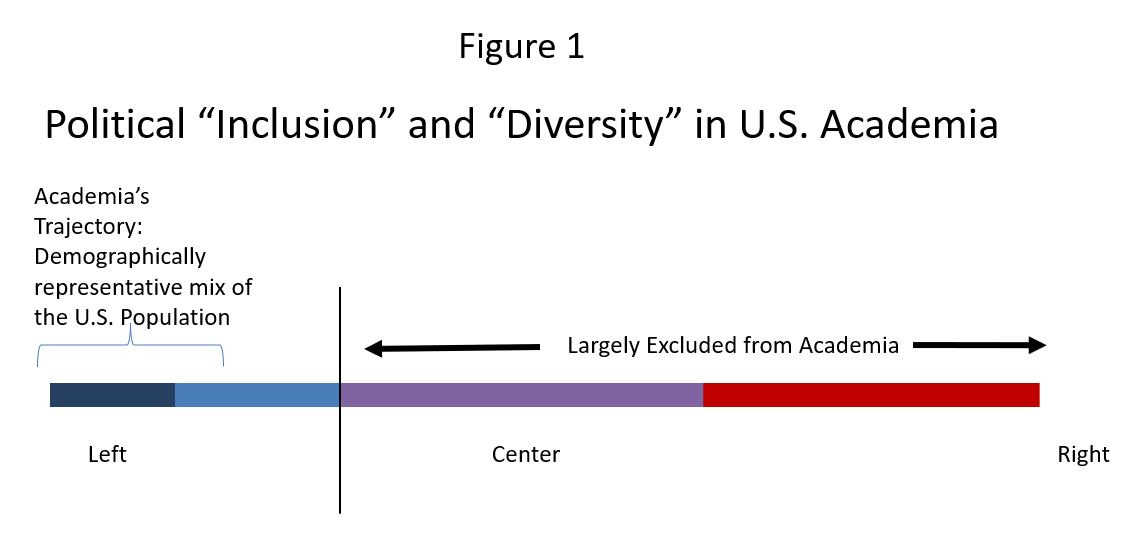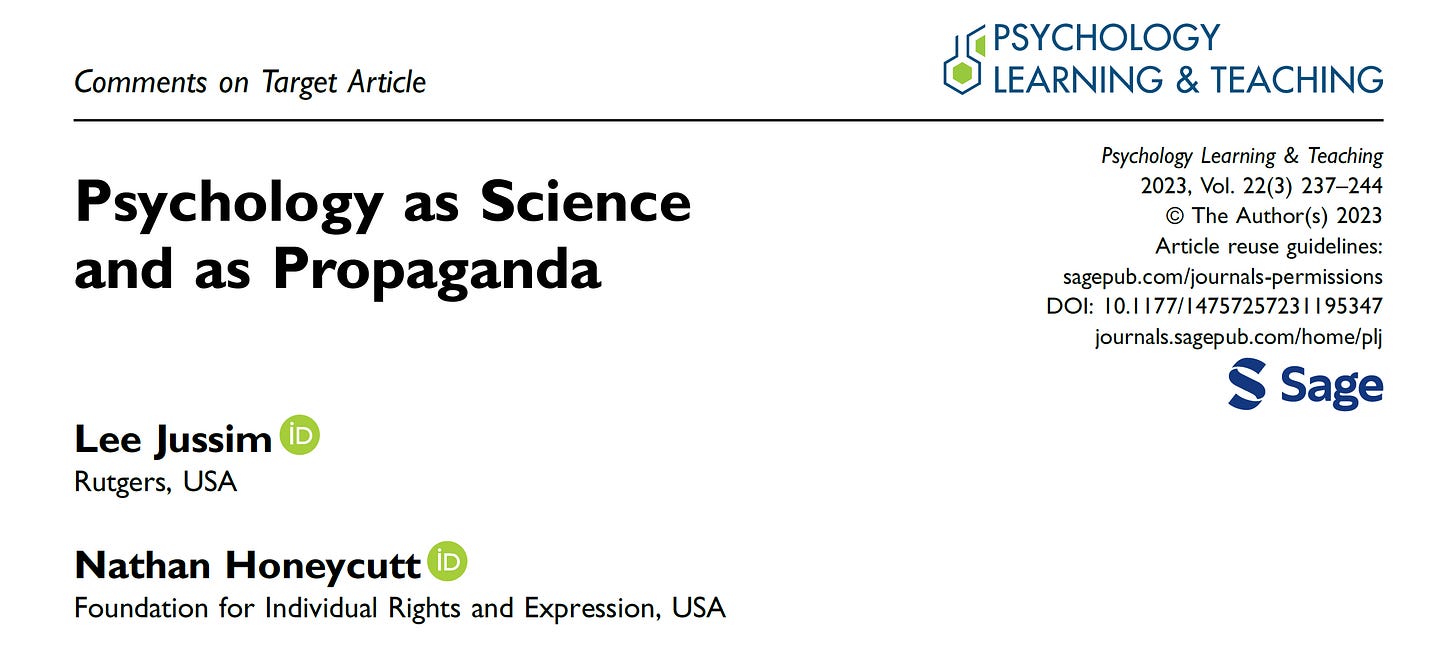Wooden Stake Post
This is a wooden stake post. Wooden stakes kill vampires. Wooden stake posts aim to kill the false, unjustified and misleading academic claims that suck the blood out of social science validity and credibility. These are essays that debunk a small piece of some academic claims typically appearing in an article or essay. These are called Wooden Stake Posts because, metaphorically, they drive a wooden stake through the heart of academic claims that suck the blood out of social science. For previous wooden stake essays, go here, here, or here.
The Bethesda Declaration of Dissent by NIH Staffers Against Trump Policies
About 250 staffers, most scientists, working for the National Institutes of Health (NIH) recently signed on and promoted their “Bethesda Declaration” of dissent from Trump administration policies regarding science and academia. It is directly addressed to Jay Bhattacharya, Director of NIH.
You can read the whole declaration here or an AP report that gives an overview and includes quotes from some signatories here. Bhattacharya has posted this thread on X contesting several of its key claims (or you can read his whole thread morphed into an essay-like form; its short).
There is a lot in there that the signatories objected to and I am not going to address most of it, mainly because I do not have sufficient information to evaluate their claims. For example, consider this claim in the Bethesda Declaration:
This Administration has forced NIH, under your watch, to:
1) Politicize research by halting high-quality, peer reviewed grants and contracts.
Health disparities. U.S. Law (42 U.S.C. § 282) states that NIH shall "utilize diverse study populations, with special consideration to biological, social, and other determinants of health that contribute to health disparities." Yet, NIH has stigmatized and abruptly cut off funding for research mislabeled "Diversity Equity and Inclusion (DEI)." Achieving your stated goal to "solve the American chronic disease crisis” requires research addressing the social and structural drivers of health disparities.
Congress has mandated research on disparities. However, it has not mandated research on DEI or for research to have a DEI component. Thus, this objection confounds two different things, disparity research and DEI. Indeed, that the NIH signatories are treating them as if they are the same thing does not speak well for their understanding of what disparities are versus what DEI is. And when you are mongering your expertness to make some political point, it really behooves you not to confuse two different ideas or policies.

Has NIH blocked all funding of research on all disparities, even if it has no DEI component?1 I have no idea. If it did, the Declaration is right to object; if it did not, it is not right.
Furthermore, just because a grant-funded project studies health disparities does not mean it cannot be defunded because of the cited law. If the administration has banned research with a DEI component, and a funded health disparities grant has a DEI component, I see no legal or ethical reason why it cannot be terminated. In such a case, it would be terminated for its DEI component, not because it studies disparities.
Is this what is going on? I have no idea, so do not comment further on this. I know even less about the facts relevant to some of their other claims, so I do not comment on them, either.
The Bethesda Declaration’s Propaganda about Diversity
I’ve written a lot about political bias, unjustified interpretations of data, and even “academic misinformation,” but the paper shown below has the clearest (albeit incomplete) articulation of how to distinguish science from propaganda masquerading as science (bonuses: It is short and open access).
Without going into all the details, it includes these two (among other) standards for determining whether some piece of writing posturing as science is actually propaganda. From the article:
Test 0: Does the study vindicate some political narrative? Test 0 is necessary [but not sufficent] because if the claim does not vindicate a political narrative, it cannot possibly be politically biased. [It is not sufficient because the claim may be true].
…
Test 2: Do the authors systematically ignore papers and studies inconsistent with their ideology-affirming conclusions? One can usually present a “compelling narrative” simply by ignoring results that disconfirm that narrative or rigorous methodological or statistical criticisms that contest or debunk it. A paper may appear “scientific” having all the trappings and form of science—but may not deserve to be called “science,” if it ignores evidence and analysis inconsistent with its narrative…
They failed Test 2. Here is the relevant text from the Bethesda Declaration:
Broad participation in biomedical research. Robust research shows diverse teams outperform homogeneous ones.
The link is to a McKinsey report, not any peer reviewed paper. Now, peer review ain’t what its cracked up to be, but that does not justify treating a single report by a consulting firm as “robust research.”
It then goes downhill from there. In contrast to the Bethesda Declaration’s reference of a corporate report, this article appeared in a peer reviewed journal:
They performed a re-analysis of the data used in the McKinsey report. Here are their conclusions:
… when we conduct a quasi-replication of McKinsey’s tests using data for US S&P 500® firms as of 12/31/19, we find a not statistically significant relations between McKinsey’s measures of executive racial/ethnic diversity and not only industry-adjusted EBIT2 margin, but also industry-adjusted sales growth, gross margin, return on assets, return on equity, and total shareholder return.
So their one source has been debunked, or, at least, strongly contested. This raises two possibilities about the Bethesda Declaration authors, at least with respect to this issue:
They knew about this and purposely left it out.
They did not know about it.
Is it worse to know the literature and lie about it or to posture as an expert and not know the literature on the very topic you are posturing about? Do we have to decide?
In the same section on diversity, they also wrote:
A broad workforce strengthens research capacity and supports globally competitive science.
Sure, the more people vying for positions, the more competition should produce higher quality among those selected. The problem with this claim is not that it is wrong or has been debunked, but that it is disingenuous. If they really cared about ensuring a “broad workforce” in academic sciences, they would have done something about this decades ago:

I agree with the substantive point: failing to include half or more of the country in academic science has always been a very bad practice. But they seem to be blissfully unaware of the implications of their own argument.
Epistemic Trespassing
Most of the signatories were in STEM fields, not social science, and are unlikely to have any serious understanding of social science on diversity initiatives.3 Here are 10:
Lots of Nobel laureates there, so they are not stupid. Just ignorant outside their field of expertise. Or, more exactly, epistemic trespassers

Being ignorant of work outside one’s expertise would be fine if they weren’t mongering their status as experts to promote demonstrably false propaganda.4
Conclusion
Scientists should not be in the business of promoting demonstrably false claims to achieve political purposes. Its not good for the society. It is the type of thing that erodes trust in scientists, academics, and experts. I have no doubt that, in general, were Richard Kornberg, the first signatory shown above and the 2006 Nobel laureate whose work focused on the mechanisms of DNA transmission, were to make a statement about the mechanisms of DNA transmission, he’d be far more likely to be correct than most of you, most of your friends, or me. But when he exploits his status as a Nobel laureate for work in biology to pontificate about the supposed benefits of diversity, he is no more expert than most of you or most of your friends. I am pretty sure I am far more expert than he is on this topic (Exhibit A: The Green & Hand paper shown above; Exhibit B: this entire Unsafe Science essay on the downsides of DEI; I could go on…). And when he does so, he risks eroding people’s trust in his claims because he actually does not know what he’s talking about. And when people confidently propound on topics of which they are ignorant, it appropriately raises question about the credibility they deserve when they propound on other topics.
There was an alternative. They might have recognized that they have no expertise in DEI, diversity, or social science writ large, and they might have refrained from saying anything about it, and just written a Declaration with statements about which they could be certain.
This sort of thing wrecks their credibility. Now that their claim about the “robustness” of research on the benefits of diversity is knowably false, a reasonable, rational person who does not have the time to fact check every other claim in The Bethesda Declaration is likely to wonder, “Maybe the rest of it is true, but its kinda hard not to wonder what else is false or misleading?” And to conclude, “If this is what the best and brightest at NIH have to offer, maybe Trump’s wrecking ball is just what’s needed.”
I actually do not reach that conclusion, but explaining why would be another whole essay. And that is not the point. Instead, the point is that by doing this sort of thing, they unnecessarily fan the flames they are trying so desperately hard to put out.
Commenting
Before commenting, please review my commenting guidelines. They will prevent your comments from being deleted. Here are the core ideas:
Don’t attack or insult the author or other commenters.
Stay relevant to the post.
Keep it short.
Do not dominate a comment thread.
Do not mindread, its a loser’s game.
Don’t tell me how to run Unsafe Science or what to post. (Guest essays are welcome and inquiries about doing one should be submitted by email).
Footnotes
Has NIH blocked all funding of research on all disparities, even if it has no DEI component? I can imagine someone posting in the comments news reports that Trump et al have blocked all research on disparities, as if that somehow demonstrates that what they are doing is against the cited law. However, if ALL research funded by NIH on disparities has a DEI component, then it seems to me to be completely legit for them to block all of it — though it would behoove them to fund new proposals on disparities in health without a DEI component. Personally, I think it is quite reasonable for scientists to seek to understand health and mental health disparities, not to mention believing in the rule of law, but it is also reasonable for the federal govt to have a policy of expunging DEI from all federally funded grants, not to mention that I also think it is a good idea.
EBIT refers to Earnings Before Interest and Taxes, a common measure of corporate performance.
Signatories STEM, not social science. Of course, if they were social scientists, the social sciences have been so infected with left activists masquerading as scientists, there is no reason to think the Declaration would have read much differently.
Demonstrably false propaganda. They may well believe their own propaganda, but it is still propaganda.











"Health disparities. U.S. Law (42 U.S.C. § 282) states that NIH shall "utilize diverse study populations, with special consideration to biological, social, and other determinants of health that contribute to health disparities." Yet, NIH has stigmatized and abruptly cut off funding for research mislabeled "Diversity Equity and Inclusion (DEI)." Achieving your stated goal to "solve the American chronic disease crisis” requires research addressing the social and structural drivers of health disparities."
Of course, subjects must be diverse since different groups and races have different diseases and susceptibilities to disease. Examples include sickle cell disease, porphyria, Tay-Sachs disease, to name but a few. Where diversity shouldn't be considered as a significant factor is in people ~doing~ the research. The law addresses the former (subjects and patients), not the latter.
The signatories knew this. They're trying to pull a fast one. And they just got caught.
Thank You!
"Epistemic Trespassing" is 100% going to be the title of my next Stack/Channel/Blog.